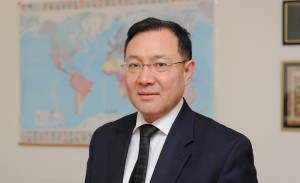 The Islamic Organisation for Food Security (IOFS) of the Organisation of Islamic Cooperation (OIC) is to be established in Astana.
The Islamic Organisation for Food Security (IOFS) of the Organisation of Islamic Cooperation (OIC) is to be established in Astana.
The institution was first proposed by Kazakhstan President Nursultan Nazarbayev in 2011 at the 38th session of the meeting of Ministers of Foreign Affairs of the OIC held in Astana. Implementing the initiative was one of the main priorities of Astana’s OIC chairmanship from June 2011 to November 2012.
The charter, name, goals and objectives, legal status and functioning processes of the IOFS were agreed upon at a meeting in Astana on June 11-12, 2013. Attending the meeting were representatives from 29 OIC member states and institutions, including the General Secretariat, SESRIC (Statistical, Economics, and Social Research and Training Centre for Islamic Countries), ICDT (Islamic Centre for Development and Trade) and the IDB (Islamic Development Bank). Among other international and regional institutions were representatives of the ECO (Organisation for Economic Cooperation) and the IFAD (International Fund for Agricultural Development).
It was agreed that the IOFS should become an independent international organisation headquartered in Astana, with the same diplomatic immunity as the OIC. It will not only identify and monitor food security in its member states, but will also implement practical policies and programmes to achieve goals and objectives contained in its charter.
The supreme governing body of the IOFS is a general assembly consisting of the ministers of agriculture or other representatives of the member countries, which will meet once a year. The chairman of the general assembly will be a session’s host country. An executive council, which will meet at least twice a year, will include representatives of eight members elected by the general assembly for three years: two representatives from each of the three regions (Africa, Asia, and Arab countries), the director general and a representative of Kazakhstan (as the institute’s headquarters, Kazakhstan will have a permanent seat on the executive council). The IOFS Secretariat, as an operational executive body, will include the director general and the staff. The director general is elected by the general assembly every four years. Funding will be generated from annual contributions from member countries, charitable donations from other parties, collections for special projects and proceeds from products and services rendered.
The OIC is supporting the serious and purposeful actions of Kazakhstan on the implementation of proposals made by President Nazarbayev concerning the new food security institution. Completing the process of legally establishing such an international institution in such a short time, deciding on the costs of the secretariat for its first three years of work and appointing a national coordinator were taken as firm steps on the part of Kazakhstan and increased OIC members’ confidence in Astana’s implementation of the IOFS idea.
During the 40th session of the OIC Council of Foreign Ministers in December 2013 in Guinea, a signing ceremony of the charter of the IOFS took place. Contrary to long-established practice of international harmonisation of statutory documents, the foreign ministers of a number of OIC member states expressed their unanimous support for the initiative, having signed the organisation’s new charter during the session. Astana’s initiative is a step in the consistent transformation of Kazakhstan into a food hub of international importance.
The initiative was also praised by President of Guinea Alpha Condé. In his welcome address to the delegates of the ministerial council, the president of Guinea noted the importance of Kazakhstan’s proposal to institutionalise the provision of food security and praised the contribution of Kazakhstan and President Nazarbayev to the global process of nonproliferation of weapons of mass destruction.
From a practical point of view, the new institution will contribute to strengthening the global position of Kazakhstan as a food producing powerhouse. Working within the institution’s various programmes to ensure food security in OIC member states will promote the export of Kazakh grain, the use of the financial capacity of the Islamic Development Bank and other Islamic financial institutions, the development of infrastructure facilities (elevators, terminals, roads, etc.), the formation of regional strategic grain reserves, the geographical expansion of grain exports, the creation of specialised funds, the development of new logistics routes, the participation in aid programmes of various countries through UN agencies and more. It will also reduce the cost of transporting Kazakh grain.
The placement of the IOFS in Astana will help our country gain experience in marketing at the international level and contribute to the development of qualified domestic specialists in international relations in the agricultural sector, since Kazakh specialists will take part in the work of the secretariat and other bodies of the institution.
The IOFS will be able to place orders for various applied research in national institutions and academia.
The author is Director of the Asia Cooperation Department of the Ministry of Foreign Affairs of Kazakhstan.

